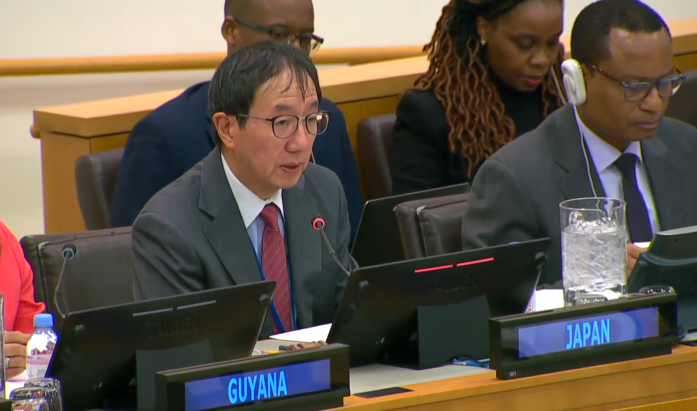包括的なアプローチを通じた平和構築と平和の持続に関する安保理アリア会合における山﨑大使ステートメント
令和6年1月22日

(As delivered)
First of all, I’d like to reiterate our gratitude for our three briefers, Assistant Secretary-General Mr. Khiari as well as Administrator Steiner and Mr. Saleh, for their insightful briefings.
Japan is pleased to hold today’s Arria-Formula Meeting, sub-titled investment in people, including empowerment of women, with Guyana and Mozambique as co-chairs.
Since the Open Debate on Peacebuilding and Sustaining Peace that Japan convened during our presidency last January, the Security Council has been discussing the multifaceted and globalized challenges which contribute to prolonged, frequent, and reoccurring conflicts.
Strengthening the political, economic and social framework of each country from the perspective of the human security and dignity, while promoting peace, security and stability, should be achieved by promoting the Humanitarian-Development-Peace (HDP) Nexus. Our collective efforts based on the nexus, should be seamless and enduring through all stages of conflict, before, during and after. In other words, a long-term and comprehensive approach is needed, and needed now more than ever. Today, we are here to discuss how we can implement such an approach efficiently and effectively.
The foundation of a comprehensive approach can be described using three perspectives.
Firstly, a long-term commitment is required, by all stakeholders, at all stages of a conflict, as it takes time to establish resilient societies.
As our Foreign Minister KAMIKAWA Yoko stated at the Second Global Refugee Forum last month in Geneva, “we must adopt a more future-oriented, medium- to long-term approach”.
Second, national ownership, which is formulated by the government and supported by its people, should be respected by all. It is the host country that exercises prime responsibility from the very beginning to build the foundation of a sustainable peace. In this vein, Japan has been advocating “investing in people” in all segments of society.
We are firmly convinced that the people we invest in should be the agents to shape and promote more effective, accountable, and resilient institutions and societies toward sustainable peace.
Finally, our endeavor should not leave anyone behind, in particular women. All participants in this process should reaffirm WPS- the Women, Peace and Security agenda, which emphasizes the need for active participation of women as leaders in conflict prevention, reconstruction and peacebuilding as well as the protection of women and girls.
As a good example, in South Sudan, Japan has long made efforts to strengthen coordination between UN peacekeeping operations (PKOs) and development actors. We have been aiding women’s capacity building and participation in peacebuilding, as well as providing assistance to victims of gender-based violence, and this assistance has had a positive effect on efforts toward peace and stability in the country.
Colleagues,
The Security Council can play a leading role to seek this long-term collaborative support on the ground, while respecting the ownership of the host country as well as leaving no one behind. I would like to raise three ideas now on how, to best utilize the UN’s toolbox.
First, the Security Council should cooperate more with the RC system to create synergies among all related stakeholders including Peace Operations, Country Teams, and the host country. A silo structure within the UN impairs effective collaboration among its mutually reinforcing tools.
Second, the Security Council can encourage greater use of the Secretary General’s good offices. The Council members should more actively utilize the SG’s suggestions on how to use the UN’s toolbox more effectively, given his role in conflict prevention including through early warning. The SG can also report about possible root causes, conflict prevention tools, and avenues for greater collaboration.
Third, the Security Council should strengthen relations with the Peacebuilding Commission (PBC) and perhaps expand its mandate to include conflict prevention as one of its clear and primal missions.
The PBC is already a platform to convene all related actors to discuss smooth collaboration with the host country and can be further strengthened in this regard. PBC meetings provide host countries with the chance to present their strategic plans and seek international expertise and support to make them happen. This venue could also be the best fit to discuss conflict prevention.
This year’s Summit of the Future and next year’s Peacebuilding Architecture Review will offer a historic opportunity for the UN, Member States and all other partners to renew our collaboration on peacebuilding and conflict prevention and upgrade the UN’s toolbox.
Let me conclude by reiterating Japan’s unwavering commitment to promoting peacebuilding and sustaining peace efforts in the UN and beyond.
I thank you.
Link to Concept Note
